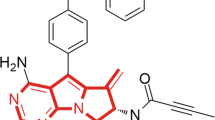Abstract
Leflunomide is a disease-modifying antirheumatic drug that inhibits paw swelling and joint destruction in type II collagen-induced arthritis in mice and it also delays disease progression in patients with rheumatoid arthritis (RA), through inhibiting proliferation and cytokine production of T cells, via the blocking of de-novo pyrimidine biosynthesis by its active metabolite, A771726. However, the direct action of leflunomide on cells of osteoclast lineage responsible for bone destruction in RA remains to be clarified. In this study, we examined the effect of A771726 on osteoclast formation and bone-resorbing activity in vitro, using cultures of bone marrow-derived osteoclast progenitors and purified functionally mature osteoclasts, and then we elucidated the molecular mechanism of action of the effect of A771726 on osteoclasts. A771726 inhibited osteoclast formation from macrophage colony-stimulating factor (M-CSF)-dependent osteoclast progenitors in the presence of receptor activator of nuclear factor kappa B (NF-κB) ligand (RANKL), without any other types of cells present, in a dose-related manner, similar to the inhibition in cultures of unfractionated bone marrow cells. In addition, A771726 suppressed bone resorption by isolated mature osteoclasts. These results indicate that A771726 directly and intrinsically inhibited the differentiation and function of osteoclast lineage cells without any mediation by other cells. The inhibition by A771726 was not restored by the simultaneous addition of uridine, and may be independent of the blockade of NF-κB activation and the tyrosine phosphorylation of proteins. Thus, leflunomide, through its active metabolite, has the potential to prevent bone loss by directly inhibiting osteoclastogenesis and osteoclast function. This inhibition suggests a novel mechanism for leflunomide in the retardation of the joint destruction observed in RA patients.
Similar content being viewed by others
Author information
Authors and Affiliations
Corresponding author
About this article
Cite this article
Kobayashi, Y., Ueyama, S., Arai, Y. et al. The active metabolite of leflunomide, A771726, inhibits both the generation of and the bone-resorbing activity of osteoclasts by acting directly on cells of the osteoclast lineage. J Bone Miner Metab 22, 318–328 (2004). https://doi.org/10.1007/s00774-003-0489-4
Received:
Accepted:
Issue Date:
DOI: https://doi.org/10.1007/s00774-003-0489-4




